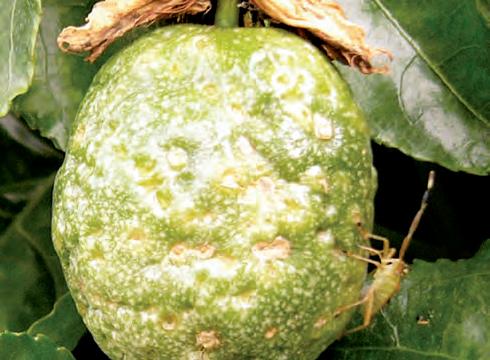
5 minute read
CHEMICAL UPDATE
HORT INNOVATION CHEMICAL ACCESS UPDATE
BY JANE RICHTER WITH INFORMATION SUPPLIED BY JODIE PEDRANA, HORT INNOVATION AND APVMA
Advertisement
The Australian Government announced a total of $4 million over two years from 2018-19 to 2019-20 for the Assistance Grants – Access to Industry Priority Uses of Agvet Chemicals program (the Program) that will run over 2 years from 2018–19 to 2019–20.
These grants were announced as part of the 2018–19 Budget measure Improved Access to Agricultural and Veterinary Chemicals, which aims to support farmers, increase productivity and grow foods for expanding export markets by improving access to AgVet chemicals.
It extends the 2014–15 Federal Budget measure titled A Competitive
Agriculture Sector — improved access to agricultural and
veterinary chemicals which was scheduled to end on 30 June 2018.
To help address the ‘minor use’ problem, the Australian Government has committed $14.3 million over six years (2014–15 to 2019–20) to the Improved Access to Agricultural and Veterinary Chemicals initiative. The aim of the initiative is to increase the number of safe, appropriate and efficacious uses of new and existing AgVet chemical products available in the Australian market.
ASSISTANCE GRANT SUMMARY OF ACHIEVEMENT BY HORT INNOVATION
$5.92m worth of AgVet Grants were provided in total across the 15 Research & Development Corporations (RDC’s)
Hort Innovation received a total of 64% of the grants that were awarded to RDC’s to fund projects to the value of $3,393,273 which equates to 57% of the total value. ROUND 1 – 2015/16
Value $1,082,299 64% Assistance Grants – Access to Industry Priority Uses of Agvet Chemicals program 2018-2020
$4m in Agvet grants are available over 2 years.
ROUND 1
— There were 75 grant applications received by the
Department of Agriculture and Water Resources (DAWR) from 10 RDC’s (32 from Hort Innovation) and 23 grants were awarded to the value of $2m. — 2018/19 - Hort Innovation were awarded 9 grants to the value of $929,351. — Other RDC grant recipients included AgriFutures (5), GRDC (3),
Forest and Wood Products Australia (2), Fisheries RDC (1),
Dairy Australia Limited (1), Australian Pork Limited (1) and
Australian Eggs (1).
ROUND 2
— There were 59 grant applications received by DAWR from 10 RDC’s (30 from Hort Innovation) and 22 grants were awarded to the value of $2m — 2019/20 - Hort Innovation were awarded 14 grants to the value of $1,321,398 — Other RDC grant recipients included; AgriFutures (4),
Thanks to the hard work and focus of the Hort Innovation team, they have secured 60% of all the grant funded projects available to RDC’s in the last five rounds of the AgVet grant programs representing an investment of $5,644,022 into increased chemical access for horticulture producers. This is an incredible outcome and deserves to be highlighted.
ROUND 2 – 2016/17 Value $1,273,966
ROUND 3 – 2017/18 Value $1,037,008
36%
OTHER
Fisheries RDC (2), Dairy Australia Limited (1), Australian Eggs (1). 48%
OTHER
52% 42%
OTHER
58%
NEW CHEMISTRY TO TACKLE FRUIT & BANANA SPOTTING BUGS
Grant received 2019/20 - DC-154 (SIVANTO ® prime) Flupyradiforone Group 4D – Label Registration
Assorted tropical and sub-tropical fruits — inedible peel — Fruit Spotting Bugs and Banana spotting bugs (this class includes Passionfruit).
FSB and BSB are a major impediment to the commercial production of most tree fruits and nuts, and some vine fruits. Growers have recorded crop losses of well over 30% due to FSB damage.
FSB attack at least 22 different types of commercial fruits and nuts. Economic losses from FSB could amount to tens of millions of dollars each year in the Australian fruit and nut industries.
SIVANTO ® prime is non-hazardous to bees making it a desirable solution with flexible application methods and timing
— A modern insecticide with an excellent safety profile for the control of major sucking pests. Its’ selectivity to most beneficial insects in fruit crops provides a perfect fit for Integrated Pest
Management (IPM) programs that industries are seeking
Bayer have a broad distribution of Maximum Residue Levels (MRLs) and import tolerances around the world for SIVANTO ® prime, which will help to harmonise trade.
Timeline

ST19020 Project will be contracted in June 2020 and trials will commence this season for a Crop Group - Assorted tropical and sub-tropical fruits - inedible peel Label Registration with Bayer
The project activities will be completed within 3 years and the data will then be provided to Bayer for a label extension.
The Australian Pesticides and Veterinary Medicines Authority (APVMA) is the Australian Government Statutory Authority responsible for the assessment, registration and regulation of agricultural and veterinary chemical (Agvet) products from manufacture or importation to the point of sale. www. portal.apvma.gov.au
ADVERSE EXPERIENCE REPORTING PROGRAM (AERP)
The AERP is a pharmacovigilance program investigating reports of adverse experiences associated with the use of a registered Agvet product. The APVMA encourages producers and resellers to report adverse experiences, including those where a product has been used off-label.
An adverse experience may involve:
— risks to safety in humans using or exposed to the product/s — lack of efficacy, when the correct label dose is used — other unintended or unexpected side effects.
Contact the AERP to discuss cases if there are concerns:
1. Online reporting form at: portal.apvma.gov.au/aerp 2. Email: AERP@apvma.gov.au 3. Phone: 1800 700 583 RECALL OF AGVET PRODUCTS FROM THE MARKET
The APVMA is responsible for the recall of Agvet products. Participation in a recall, whether it is initiated by the manufacturer or the APVMA, is mandatory.
Agvet products may be recalled (or ordered to stop supply) due to:
— risks to safety — a lack of efficacy — the product being unregistered — formulation errors — labelling or manufacturing errors
The best way to be kept informed of recalls is to subscribe to the APVMA’s listing of recalls notices. To be notified of recalls via email, stakeholders are invited to complete a subscription form and select ‘recall notices.’



